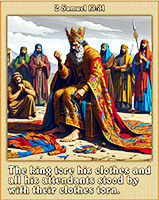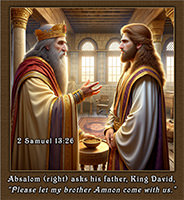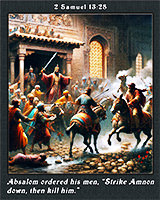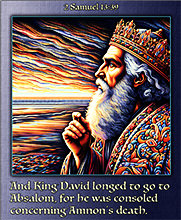2 Samuel 13:23–39 . . . Bible Study Summary with Videos and Questions
“Absalom Kills Amnon”
Putting this latter half of chapter 13 into perspective, the author’s references to “two years” (v. 23) and “three years” (v. 38) bracket this literary narrative. Absalom patiently and carefully plotted revenge on Amnon. As the sheep of Absalom would lose their wool (vv. 23–24), so David’s firstborn, the potential shepherd of Israel, would lose his life (vv. 28–29).
Absalom’s hatred of Amnon simmered for two years. Then he made his move. Spring’s sheep-shearing is often celebrated with festive meals and a spirit of generosity as the wool was harvested (1 Samuel 25:8). Absalom arranged a huge party at his ranch, on a hill in Baal Hazor, 4 to 5 miles northeast of Bethel and about 17 to 18 miles north of Jerusalem. See, next, how Absalom conspired with David in this vengeful act.
[Note: Click the link to This Week’s Passage near the bottom of this page to read today’s Scripture.]
Absalom Invites All the King’s Sons to a Feast (2 Samuel 13:23–27)
Two years had passed since Tamar had been raped by Amnon (v. 23) but Absalom didn’t stop plotting to avenge Amnon’s sin. It seems as though David may have ranted and raved in his anger over Amnon’s rape of half-sister Tamar, even if he didn’t deal with Amnon as he should have. But Absalom apparently yielded the essence of self-control. He concealed his hatred and anger, acting as if nothing had happened. But in his heart he’d already planned to make Amnon pay for ruining his sister’s life. He had the motive; all he needed was the means and opportunity. That would come two years later. Until then, Absalom didn’t so much as speak to Amnon. He treated him as though he didn’t exist; as we read these verses, soon Amnon will no longer exist.
After two years passed, seemingly all had been forgotten and Amnon had gotten away with his crime. Absalom may have made other attempts to remove Amnon from David’s watchful eyes and protection and failed, but this time his plan would succeed. Sheep-sheering time had come, and Absalom, like many others, had planned to celebrate. Sheep shearing was a festive time, and it was natural that Absalom would have a great feast and invite Amnon and all the king’s sons to it. He knew that David could appreciate such things, not only as a former shepherd boy but also from his experiences in the more recent past. This was the pretext Absalom had sought.
Absalom made a big point of trying to get his father and his royal court to come to his big party (vv. 23–24), knowing that they likely wouldn’t attend. When David made his excuses (v. 25) and declined, he gave Absalom his blessing; he expected this response and didn’t give up. He then pressed David for what he really wanted: to request that his father send Amnon, the crown prince, to represent him and convey his blessings on this occasion. David likely wondered, Why would Absalom ask specifically for Amnon to come? David then pressed Absalom on this point, but he seems to have avoided the question. So, Absalom continued to pressure his father to send Amnon. David questioned this request but agreed to send all his sons to the festivities (v. 27).
Do you see in Absalom some of the same cunning that you saw in Amnon? He asked his father, King David to allow Amnon and all the king’s sons to come to a big feast, which made David partly responsible for their meeting, just as Amnon deceptively got David to allow Tamar to visit him and prepare food for him. With Amnon being unguarded at the celebratory feast, Absalom would then be able to get to him.
Absalom Kills Amnon (vv. 28–29)
Having already formulated a plan, Absalom gave his servants their instructions. Just as David instructed Joab to kill Uriah, now Absalom instructed his servants (v. 28) to kill Amnon when he’d become drunk. As a cunning killer, Absalom waited until nervous Amnon became relaxed and vulnerable after drinking a few cups of wine. At that moment, Absalom gave the order to “Strike Amnon down!” and they murdered him. God had previously promised David that “the sword shall never depart from your house” (2 Samuel 12:10) in judgment of his sin, which was definitely a partial fulfillment of this promise. Just as David had committed adultery and made Uriah drunk before murdering him, so Amnon had committed incest, was made drunk, and was then murdered.
The crown prince was assassinated by the man who was second in line to the throne, who’d soon become the next in line for it. Absalom’s primary motive was to avenge his sister’s rape and rejection. However, this plan of Absalom’s was aligned with another strong ambition: to become king himself! With the crown prince dead on the ground (v. 29), the other princes fled to Jerusalem while Absalom fled in the opposite direction, north to the Aramaean kingdom of Geshur, northeast of the Sea of Galilee. Absalom sought asylum there with his mother’s relatives, a powerful royal family.
David Learns of Amnon’s Murder (vv. 30–36)
…from bible.art

Click to enlarge and download
this image of sad King David
tearing his clothes:
2 Samuel 13:31.
Having read this passage’s next seven verses, it seems that the author may have devoted so much text to straightening out the rumor that Absalom had killed all the king’s sons in order to stress God’s mercy in not cutting off all of them. At first report, David probably thought God had judged him severely, but it became clear that God had been merciful. Jonadab may have been a member of David’s cabinet (2 Sam. 13:3). And, as David’s nephew, he was a member of the royal family (v. 32). He and Absalom may have collaboratively hatched the conspiracy against Amnon to remove the heir apparent to the throne. After all, we’ll realize that Jonadab knew precisely what had happened to Amnon at the big party.
The remainder of David’s sons were terrified when they saw Amnon killed by Absalom’s servants. Might Absalom have intended to kill them, too? Not waiting around to find out, they all mounted their mules and fled back toward Jerusalem. News reached David before his sons were sighted. As was often the case, this initial news report had been exaggerated. Someone reported to David that all of his sons had been slain; not one was left alive. What intense suffering David underwent for that short period of time. It was like the death of his son that Bathsheba bore to him, multiplied many times over. David tore his clothes and fell prostrate on the ground (v. 31), with all of his servants following his lead. It’s significant that he didn’t react to this news with disbelief. He sensed that Absalom was capable of such evil. David reacted with mourning instead of disbelief.
During the interim between the first (inaccurate) report and the arrival of his sons, Jonadab approached David, assuring him that the report wasn’t true. He told David that only one son — Amnon — was dead and that this had been the intended plan of Absalom, from the day his sister Tamar was raped by Amnon. Jonadab urged, therefore, that the king shouldn’t mourn excessively, as if all of his sons were dead (vv. 32–33). He’d brought the “good” news to David that only Amnon was dead, probably hoping to gain favor with King David by bringing this more favorable news. But God knew that Jonadab had set the whole course of events in motion with his wicked advice to Amnon (13:3–5). Shortly after Jonadab assured David that only one son was dead, the watchman looking out saw that many men were coming. Soon, all but two of David’s sons arrived in Jerusalem: Amnon who was dead and Absalom who’d killed him and fled subsequently. At the time, weeping commenced by David’s sons, with David joining them as they mourned firstborn Amnon’s death. All the king’s sons wept bitterly (v. 36). And the author writes in v. 37b, “But King David mourned many days for his son.”
Interestingly, we ought to realize that (shrewd) Jonadab hadn’t accompanied David’s sons to the feast at Absalom’s ranch; he wasn’t there to see what had happened. How could Jonadab have assured David that those reports weren’t true if he wasn’t there to see and verify what had happened? Jonadab had known for some time what Absalom’s intentions concerning Amnon were. He knew that Absalom was planning to kill Amnon, and he neither said nor did anything to prevent it. He seemingly had a very shrewd reason for telling David, before his sons returned to Jerusalem, that only Amnon had died. Their arrival proved that Jonadab knew what he was talking about. When they arrived, Jonadab said to David, “See, the king’s sons have come; it has happened just as your servant said” (v. 35). Jonadab was likely trying to make points with David.
Absalom Flees to Geshur (vv. 37–39)
Absalom didn’t go to a city of refuge because he was guilty and the cities of refuge were meant to protect only the innocent. He fled instead to Talmai, Ammihud’s son, king of Geshur. This made sense for Absalom because his mother’s father was the king of Geshur (3:3).
In vv. 38–39, we learn that Absalom’s exile was now in its third year and that the spirit of King David longed to go to Absalom, for he was consoled concerning Amnon’s death. After three years, the sting of Amnon’s murder wasn’t as sharp. And David simply longed to be reconciled to Absalom again, without correcting him for his evil. David’s initial indulgence towards Amnon was repeated towards Absalom who’ll meet a similar end.
Shortly after Jonadab assured King David that only one son was dead, the watchman looking out saw that many men were approaching. Soon, all but two of David’s sons arrived in Jerusalem: Amnon who was dead and Absalom who’d killed him and fled subsequently. During that time, weeping by David’s sons commenced, with David joining them as they all mourned Amnon’s death, everyone weeping bitterly (v. 36).
Closing Considerations about David
So far, at least six consequences of David’s sins against Bathsheba and Uriah have surfaced (as revealed in our summary of 2 Sam. 12:1–14): First, the child that Bathsheba bore died; second, Amnon raped Tamar; third, Absalom broke off communication with his brother, Amnon; fourth, Absalom murdered Amnon; fifth, Absalom left the country and his family; and sixth, David had become an even more passive father. This family had become dysfunctional. It’s remarkable how often children repeat the sins of their parents (cf. Genesis 12:13; 26:7). Nevertheless, God can break that imitation chain.
Further, When David “sowed to the flesh,” he reaped what the flesh produced. Moreover, he reaped the consequences of his actions, even though he’d confessed his sin and been forgiven for it. Recommendation going forward: Make a hearty effort to underline it, star it, mark this deeply upon your conscious mind: Confession and forgiveness can in no way stop or prevent a harvest of sinfulness. David had sown; ultimately he was to reap. Forgiven he was; but the consequences continued. We’re not to be deceived, for God won’t be mocked. What we sow we’ll reap; there are no exceptions (Galatians 6:7).
This passage encourages us to stay out of sin. But it also instructs us that once sin has begun, the sooner it is stopped, the better for everyone. How much better for all if shrewd Jonadab had rebuked Amnon for his sinful lust, rather than tell him how he could get what he wanted! How much better if David had recognized the evil of Amnon’s request and refused to allow his daughter to see Amnon, as well as to refuse to permit his son Amnon to go to Absalom’s party!
And there’s a passivity here toward the sin of others which is painfully evident: Those who won’t correct those who sin become co-conspirators in their expanding sin. How many families have experienced great heartache because a mother or father refused to discipline a willful or wayward child? How many marriages have broken up because a husband or wife refused to deal with sin in their lives or in the life of their mate? Sadly, how often we see that families have taken the course of action that Absalom recommended, keeping sin a family secret.
One of the purposes of 2 Samuel 13 is to help the reader prevent this type of sin, rather than to help us recover from it, having fallen. This chapter gives us a strong warning against letting our passions lead us, knowing well the consequences that will follow. May we learn from this chapter and remember it often.
† Summary of 2 Samuel 13:23–39
Today’s follow-up passage continues the tragic consequences of Amnon’s sin against Tamar, now unfolding through Absalom’s calculated revenge. Two years after the assault, Absalom invites all the king’s sons to a sheep-shearing feast in Baal Hazor (13:23–24). At first David declines to attend, but permits Amnon and the other princes to go (vv. 25–27). Absalom secretly instructs his servants to wait until Amnon is merry with wine, then strike him down (vv. 28–29). When Amnon is killed, the other sons of David flee in fear, riding off quickly. News reaches David that “all” his sons are dead, but Jonadab, the same man who earlier advised Amnon, reassures the king that only Amnon has been killed, explaining Absalom’s long-held grudge since the day Amnon violated Tamar (vv. 30–33).
Soon the surviving sons return, and the king and his household weep bitterly for Amnon (vv. 34–36). Meanwhile, Absalom flees to Geshur, the kingdom of his maternal grandfather Talmai, son of Ammihud, where he remains for three years (vv. 37–38). David mourns for Amnon continually, but over time his grief shifts toward a longing to be reconciled with Absalom (v. 39). This account demonstrates the destructive cycle of sin, unchecked anger, and delayed justice within David’s household, foreshadowing even greater family and national turmoil to come.
Key points with verse references:
• Two years after Amnon’s assault on Tamar, Absalom invites all the king’s sons to a sheep-shearing feast (vv. 23–24).
• Although David declines to attend, he agrees to send Amnon and the other princes at Absalom’s urging (vv. 25–27).
• Absalom orders his servants to kill Amnon, once he becomes drunk, successfully carrying out his plan (vv. 28–29).
• Misleading news first reaches David that all his sons are dead, but Jonadab clarifies that only Amnon was killed in revenge for Tamar (vv. 30–33).
• Absalom flees to Geshur for three years, while David mourns Amnon and eventually desires to see Absalom again (vv. 37–39).
This Week’s Passage
2 Samuel 13:23–39
New International Version (NIV) [View it in a different version by clicking here; also listen to chapter 13 narrated by Max McLean.]
Summary Video: “The Second Book of Samuel”
† Watch this introductory video clip created by BibleProject on bibleproject.com.
- Q. 1 Can your confessions and forgiveness prevent your receiving the consequences of your sin?
- Q. 2 What’s an example of how this passage can keep you from sinning?



